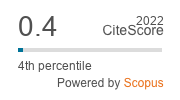Persistence of phorate and its Residual Toxicity to Aphis Craccivora Koch. in Cowpea
DOI:
https://doi.org/10.33307/entomon.v1i1.1123Abstract
Enzymatic assay of internal residues of phorate in cowpea yigiia sinensis following application of the insecticide as granules with seed at 1, 2 and 3 kg a.i. / ha showed that residues of the toxicant persisted within the plants upto 49 days following the application. On the 56th day, there was no residue of the insecticide either in the leaves or in the pods. The mortality of Aphis craccivora exposed to the plants treated with the granules was 100 percent upto 14 days with I and 2 kg a.i / ha and upto 21 days with 3 kg a.i/ha. The mortality showed a gradual reduction corresponding to the reduction of the internal residue of the insecticide, there being no mortality on on 56th day of insecticide application. Application of phorate granules at 2kga.i/ha, with the seeds is considered an effective and safe method for protecting Cowpea from infestation bv A. craccivora up to 8 weeks of its growth.
Downloads
Published
How to Cite
Issue
Section
License
Copyright (c) 2024 Association for Advancement of Entomology

This work is licensed under a Creative Commons Attribution-ShareAlike 4.0 International License.


